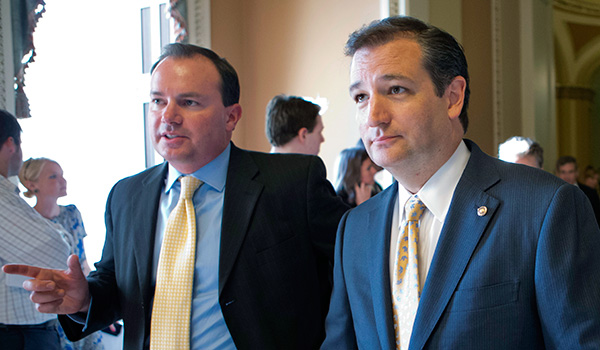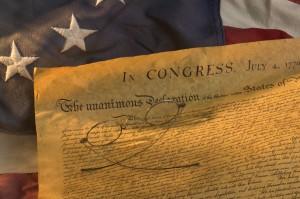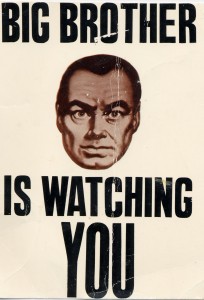Ted Cruz and Mike Lee are Heroes.
October 12th, 2013 // 3:11 pm @ Oliver DeMille

At some point, America is going to have to face reality. We can’t keep increasing government spending, debt, and borrowing without eventually paying for it. But the problem is deep:
When Americans are asked if they want to get rid of our $17 trillion debt and huge deficits, they say, “Yes.”
When they are told that we need to cut any actual government spending program, any program, they say, “No.”
What gives? Essentially, Americans want to get more from government but pay less. Ted Cruz was popular among conservatives when he stood against Obamacare, but when the media pushed back, conservative support decreased.
Mike Lee was popular in his home state when he took the same stand vocally, but his popularity decreased a little when he took real action to help slow the negative facets of Obamacare. Other leaders have seen the same thing.
Too many of the American people want our leaders to reduce our out-of-control debt and deficits, but they don’t want it to be hard. They want it to be easy. They support those who talk tough, but withdraw support when a leader takes courageous action.
Mike Lee, Ted Cruz, and others, including a number of House Republicans, who take a stand against expanding government are heroes, pure and simple. This is true of anyone, from any party, who stands for what our nation really needs. Their stand against the expansion of big government deserves a lot more support.
Our national economic problems are going to get worse and worse until leaders take a stand to reduce spending and borrowing. But when some leaders do this, popular opinion frequently turns against them. If this remains true, Americans deserve the economic difficulties that will keep growing. If we want something better, we need to stand up for it.
Instead of complaining that our leaders don’t do enough of the right things, we need to strongly support the few leaders who actually do take action. Instead of repeating the national mantra, “Why can’t everyone just get along in Washington?,” we need to be the kind of citizens who know that a better future is worth fighting for. Thank goodness some of our leaders understand this.
Lee or Cruz for president. Or, if you’re a Democrat, look up the recent speeches of Joe Manchin. Bring in Paul, Rubio, Ryan, and anyone else who is standing for common sense. We need to stand behind leaders, regardless of party, who actually see what is needed and do something about it—regardless of how it plays in the polls. Those who do this are today’s heroes.
 Oliver DeMille is the New York Times, Wall Street Journal and USA Today bestselling co-author of LeaderShift: A Call for Americans to Finally Stand Up and Lead, the co-founder of the Center for Social Leadership, and a co-creator of TJEd.
Oliver DeMille is the New York Times, Wall Street Journal and USA Today bestselling co-author of LeaderShift: A Call for Americans to Finally Stand Up and Lead, the co-founder of the Center for Social Leadership, and a co-creator of TJEd.
Among many other works, he is the author of A Thomas Jefferson Education: Teaching a Generation of Leaders for the 21st Century, The Coming Aristocracy, and FreedomShift: 3 Choices to Reclaim America’s Destiny.
Oliver is dedicated to promoting freedom through leadership education. He and his wife Rachel are raising their eight children in Cedar City, Utah.
Category : Blog &Citizenship &Current Events &Economics &Government &Independents &Leadership &Politics &Prosperity
The Death of The Middle Class
July 19th, 2013 // 10:51 am @ Oliver DeMille
Columnist Joe Klein said on The Chris Matthews Show:
“This is the biggest problem that we’re facing going forward. We were a homogenous, middle class country, by and large, for the fifty years after World War II.
“Now we’re no longer homogenous, and there’s a good aspect to that in that we have become a true multiracial country. But there’s a bad aspect to that, in that the middle class, which was the heart of this country, is beginning to fracture, and to panic, in many ways.
“And unless we figure out a way to find jobs for the vast middle class in this country, it’s going to be really hard to sustain democracy. We now have a plutocracy in this country.”
This is exactly true, and many Americans feel Wall Street and Washington are working together against the middle class.
Worse, many people aren’t sure that any solution is ahead.
Many experts suggest that education can solve the class divide, but the people realize that most schools are actually increasing the gap between elites and the rest.
Modern schooling has become a huge part of the problem, not a solution.
The only real solution is a widespread shift from the employee mentality to entrepreneurship.
As David Ignatius points out, many immigrants to America see the United States as a great place to start businesses.
Sadly, most native-born Americans are afraid of entrepreneurship and feel that jobs should be plentiful—as if it were a birthright.
The future of American freedom hinges on this question: will the current generation of Americans embrace entrepreneurialism, or will we keep whining about Washington while waiting for more jobs to somehow appear?
Is the American spirit dead, or is free enterprise still one of our greatest American traditions?
Only the regular people can make this choice.
***********************************
 Oliver DeMille is the chairman of the Center for Social Leadership and co-creator of Thomas Jefferson Education.
Oliver DeMille is the chairman of the Center for Social Leadership and co-creator of Thomas Jefferson Education.
He is the author of A Thomas Jefferson Education: Teaching a Generation of Leaders for the 21st Century, and The Coming Aristocracy: Education & the Future of Freedom.
Oliver is dedicated to promoting freedom through leadership education. He and his wife Rachel are raising their eight children in Cedar City, Utah.
Category : Aristocracy &Blog &Business &Citizenship &Culture &Current Events &Economics &Entrepreneurship &Featured &Leadership &Producers
A Surprising Choice by America’s Founders
July 18th, 2013 // 10:48 am @ Oliver DeMille
 One of the most surprising events in the American founding occurred when the Continental Congress used the word “happiness” in the Declaration of Independence.
One of the most surprising events in the American founding occurred when the Continental Congress used the word “happiness” in the Declaration of Independence.
Up to that point, it was not a word often utilized in great political writings.
Words like “justice,” “liberty,” “property,” “honor,” “power,” “rights” and others were expected in such a document.
But “happiness” was not.
George Washington expressed the American perspective when he said, “the United States came into existence as a nation, and if their citizens should not be completely free and happy, the fault will be entirely their own.”
In this view, a good government protects people’s freedom, and what they do with it is up to them—and determines their happiness.
Still, the very idea that governments are instituted among men to do just this (protect a person’s right to pursue happiness), was a significant thought.
It was certainly not the view of the European aristocrats, who believed that happiness required financial means and the comforts of leisure time and was only meant to be enjoyed by a few.
The American founding generation took a different view.
They believed that happiness was the result of enterprise, and was possible for everyone.
This is a patently American perspective, and it provided a foundation for the whole American freedom experiment.
It is a profound idea.
If happiness is the result of individual actions and choices, then it follows that government’s primary role is to protect the right to act and choose.
Indeed, in such a view, the only purpose of government and law is to keep any person from taking these rights from anyone else—or of enforcing restitution if such protection fails.
This is the proper role of government: to protect inalienable rights (defense), and if this fails to cause restitution (justice).
This was the crux of the American system, the only one that could really be adopted if the goal of government was to protect “life, liberty and the pursuit of happiness.”
In ancient Rome, the Stoics argued that virtue is the cause of happiness, and this same view was promoted by ancient Judaism and early Christianity.
In feudal times, the meaning of happiness switched more to “good fortune,” which took it out of the hands of each individual.
By 1600, however, this was refined to mean “a pleasant and contented mental state.”
The American founding generation added to the meaning of “happiness” with the idea of voluntarily doing important things—from personal morality to economic enterprise, to family relationships, political and military sacrifice, and charitable service.
They also connected these same things to the concept of freedom, thereby forever linking the words “freedom” and ‘happiness.”
This bears repeating, because it is a central foundation of American government, but has been mostly forgotten today.
Specifically, the American founders put forward an amazing new view of government:
The proper role of the government is to protect inalienable rights, and to leave everything else to the people—who will increase or lose their liberty and happiness according to their personal virtue, economic enterprise, family relationships, charitable service, and other voluntary choices.
For the Founders to adopt this view was a remarkable and vitally important turn of world events, and it established a whole new view—and era—of freedom.
To a large extent, we have now lost this view, and our freedoms have decreased with this change.
We now follow the more traditionally European perspective that great changes in society come from the upper class, experts, elections, and government officials and policies.
The Founders disagreed.
They believed that the American Founding was the result of the people, not a few great leaders.
As John Adams responded when someone tried to compliment his role in the founding: “Don’t call me ‘Godlike Adams,’ ‘The Father of His Country,’ ‘The Founder of the American Republic,’ or ‘The Founder of the American Empire.’ These titles belong to no man, but to the American people in general.”
Freedom and happiness are always connected, and they are always up to the regular people, whether they realize it or not.
To the extent that freedom is declining, it is the fault of the regular people.
Our freedoms and happiness are up to us.
If freedom is in decline, we aren’t doing enough.
The good news is that the people have the power to do something about it, no matter how much the experts try to convince us otherwise.
***********************************
 Oliver DeMille is the chairman of the Center for Social Leadership and co-creator of Thomas Jefferson Education.
Oliver DeMille is the chairman of the Center for Social Leadership and co-creator of Thomas Jefferson Education.
He is the author of A Thomas Jefferson Education: Teaching a Generation of Leaders for the 21st Century, and The Coming Aristocracy: Education & the Future of Freedom.
Oliver is dedicated to promoting freedom through leadership education. He and his wife Rachel are raising their eight children in Cedar City, Utah.
Category : Blog &Citizenship &Culture &Featured &Government &History &Leadership &Liberty
Understanding the Battle
July 10th, 2013 // 6:34 pm @ Oliver DeMille
 The following describes one side of the modern battle for our future:
The following describes one side of the modern battle for our future:
“You believe you can change the world for good, one person at a time. You prioritize your children and your neighbors above your own consumption.Fulfillment for you comes through love and service, not accumulation of material goods.”
And the next one describes how the other side of the battle attacks the good:
“I’d thought these ideas placed people like you in an emotionally vulnerable position. You strive for an ideal, and since people are inherently imperfect, they will ultimately let you down….
“I obscured the idea of intrinsic self worth by encouraging comparisons with other people—people who were unnaturally perfect because I made them up. I appealed to peoples’ egos as well as their insecurities by promoting the idea that it was not enough to be unique or to do good.
“My intent was to convince them that the only meaningful accomplishment was to be better than someone else. That got them more concerned with promoting a perception of goodness than with actually doing good.”
These profound words, from The Curtain by Patrick Ord (which is a great and fun read), provide a nutshell summary of what is wrong with our modern world and why freedom is in decline.
Let’s be clear.
It is essential to teach our children than being your unique self and doing good really is enough.
In fact, it is what life is all about.
Doing good. Serving others. Improving the world.
Nobody needs to be better than others, we all just need to be the best we can personally be.
We don’t need to be perfect, but we do need to lose our lives in doing good things.
We must never be distracted into promoting a perception of goodness.
We should put all our energy into actually doing good.
Not forcing good through government, but just getting to work helping the world become a better place.
These principles are simple and true.
But the future of freedom depends on most of us really believing and living them.
***********************************
 Oliver DeMille is the chairman of the Center for Social Leadership and co-creator of Thomas Jefferson Education.
Oliver DeMille is the chairman of the Center for Social Leadership and co-creator of Thomas Jefferson Education.
He is the author of A Thomas Jefferson Education: Teaching a Generation of Leaders for the 21st Century, and The Coming Aristocracy: Education & the Future of Freedom.
Oliver is dedicated to promoting freedom through leadership education. He and his wife Rachel are raising their eight children in Cedar City, Utah.
Category : Blog &Book Reviews &Citizenship &Featured &Government &Leadership &Producers &Service &Statesmanship
Losing Faith in Washington?
June 17th, 2013 // 12:07 pm @ Oliver DeMille
 President Obama’s fundamental argument since his campaign and through his first term and second campaign has been that our society can benefit more from government than it has in the past.
President Obama’s fundamental argument since his campaign and through his first term and second campaign has been that our society can benefit more from government than it has in the past.
This is an easy sell in Europe, but not so much in the United States.
The framers mistrusted government, and felt that freedom can only last in a society where the people keep a close eye on all government activity.
But in the last few decades, many Americans have become used to increasing government benefits and programs.
The majority now votes for more government, not less.
Recent events have put a bit of a damper on the big government argument, however.
With scandals piling up like dominoes, from IRS targeting and Benghazi to AP phone records and PRISM to surveillance of Americans’ private emails and phone calls, the people are returning to a concern about Big Brother.
Even a number of strong supporters of the Obama Administration are calling for a new look at the current trajectory.
For example, Chris Matthews called on President Obama to take responsibility for his Administration’s actions, and the New York Times Editorial Board wrote: “The administration has now lost all credibility on this issue. Mr. Obama is proving the truism that the executive branch will use any power it is given and very likely abuse it.”
Both the Bush and Obama Administrations overreached their powers, and in fact such abuses go back to the Clinton, Bush I and earlier administrations.
In short, Washington is in some ways out of control, and our freedoms are at stake.
In the face of all these scandals, President Obama has told the American people that these are simply the normal “inconveniences” of keeping our nation safe.
Note that this is the argument used by many throughout history who wanted to increase the power of government over its people.
But there is a big difference between this round of scandals and those that have come in past decades.
Amazingly, the White House isn’t acting as if it is under siege.
As David Brooks wrote on June 6 in The New York Times:
“There’s a weird calm around Washington these days. The Obama administration only has a year before the lame-duck status sets in. Yet you don’t get a sense of urgency.
“White House officials seem busy running the government, but they are not filling the public space with a transformational second-term agenda. Republican leaders aren’t offering bold plans either.”
The current Administration has lost its credibility concerning its main purpose—to expand the role of government.
Still, many people really do want government to do more for them.
As long as the majority believes in ever-expanding government, it is going to endure scandals and keep electing leaders who will deliver.
***********************************
 Oliver DeMille is the chairman of the Center for Social Leadership and co-creator of Thomas Jefferson Education.
Oliver DeMille is the chairman of the Center for Social Leadership and co-creator of Thomas Jefferson Education.
He is the author of A Thomas Jefferson Education: Teaching a Generation of Leaders for the 21st Century, and The Coming Aristocracy: Education & the Future of Freedom.
Oliver is dedicated to promoting freedom through leadership education. He and his wife Rachel are raising their eight children in Cedar City, Utah.
Category : Blog &Current Events &Featured &Government &Leadership &Politics











